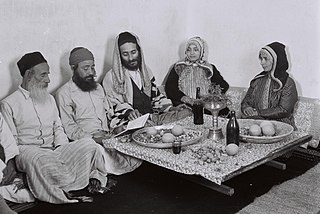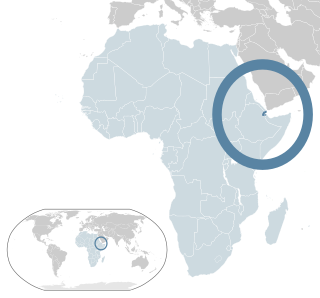Jewry in Somalia
The presence of Jewish communities in Somalia has been the subject of much speculation and debate throughout history.[ citation needed ] Historical records[ by whom? ] suggest that a small number of Jews, estimated to be around 100-200 individuals, migrated to Somalia in the early 1900s as traders and settled in coastal towns such as Berbera, Zeila and Brava. However, a report by the Jewish Telegraphic Agency (JTA) published in 1949 stated that there were "no Jews left in Italian and British Somaliland". [2] Despite this, there are indications that both traditional and crypto-Jews may have continued to reside in Somalia even after this time.[ citation needed ]
Yemenite Jews in Somalia
It is believed that a wave of Yemenite Jews arrived in the Somali territories in the 1880s, and other Ottoman friendly territories around the same time when Yemenites immigrated to the Ottoman Jerusalem. From 1881 to 1882, a few hundred Jews left but more arrived until 1914. Yemenite-Somali Jews served as prominent leaders in successive Somali governments of the 1960s and 1970s. However, in the 1970s when Somalia joined the Arab League, many Yemenite-Somali Jews sold their businesses and emigrated. Today, present-day Yemenite-Somali Jews are estimated to be no more than 5 to 10 merchant families widely distributed along the coast in Benadir coast, and northern Somali cities. The ruins of historic Eastern Synagogues can still be found in Obbia town in Somalia, but many smaller local synagogues in towns such as Hafun, Alula and Bender-Qasim were destroyed by the Italian fascists in the 1930s.[ citation needed ]
While the history of traditional Jewish communities in Somalia is relatively well-known, little is understood about the crypto-Jews who practiced their faith discreetly. The true extent of Jewish presence and influence in Somalia remains a topic of ongoing research and debate. [3]
Israel–Somalia relations
This section has multiple issues. Please help improve it or discuss these issues on the talk page . (Learn how and when to remove these messages) |
Israel was among the first nations to recognize Somalia.
In 1974, Somalia joined the Arab League and complied with the Arab League boycott of Israel. [4] [ better source needed ]
In 2017, Somali President Mohamed Abdullahi "Farmajo" Mohamed refused to meet Israeli Prime Minister Benjamin Netanyahu during a visit to Kenya. During the African Heads of State meeting in Nairobi, Farmajo refused to engage in a meeting with Netanyahu. This move was praised by Hamas, with senior member Mousa Abu Marzouq stating that "attitudes have value and meaning, and their country has respect and appreciation, and their people have dignity". Izzat Al-Rishq, another member of Hamas, thanked the Somali president's position, which he said "reflects the authenticity of the brotherly Republic of Somalia in standing with Palestine and rejecting any normalization with an entity which occupies land and holy places." This stance is indicative of the ongoing tensions between Somalia and Israel, with many in Somalia standing in solidarity with Palestine and opposing any normalization of relations with Israel. [5]
in 2020, it was reported that Israel had been providing humanitarian aid to Somalia in the form of food and medical supplies.[ citation needed ]
In 2022, the President of Somalia announced that his government would establish diplomatic relations with Israel in the near future. This move was met with mixed reactions, with some praising it as a step towards modernization and development, while others criticized it as a betrayal of the Palestinian cause. [6] [ better source needed ]
Ethiopian Judaism in the Somali peninsula
Judaism has a rich history in the Somali peninsula, with both Ethiopian and southern Arabian strains present in the region. While there is limited evidence of any Somali clans embracing Judaism during the pre-Islamic era, the conversion of individuals and families cannot be ruled out. The Hebrew heritage of marginalized Somali clans, including the Yibir, can be traced back to the Beta Israel, or Ethiopian Jews. By the 16th century, the Somali population had largely adopted Islam as their primary religion. [7]
Ethiopians brought their brand of Christian orthodoxy and elements of Judaism with it. This is evident in the presence of Jewish archeological evidence in the region, such as ancient cemeteries in the Hargeisa region of Somaliland embossed with the Star of David. [8] The Damot Kingdom, led by the Jewish Queen Gudit, also had a significant impact on the spread of Judaism in the region.[ citation needed ]











